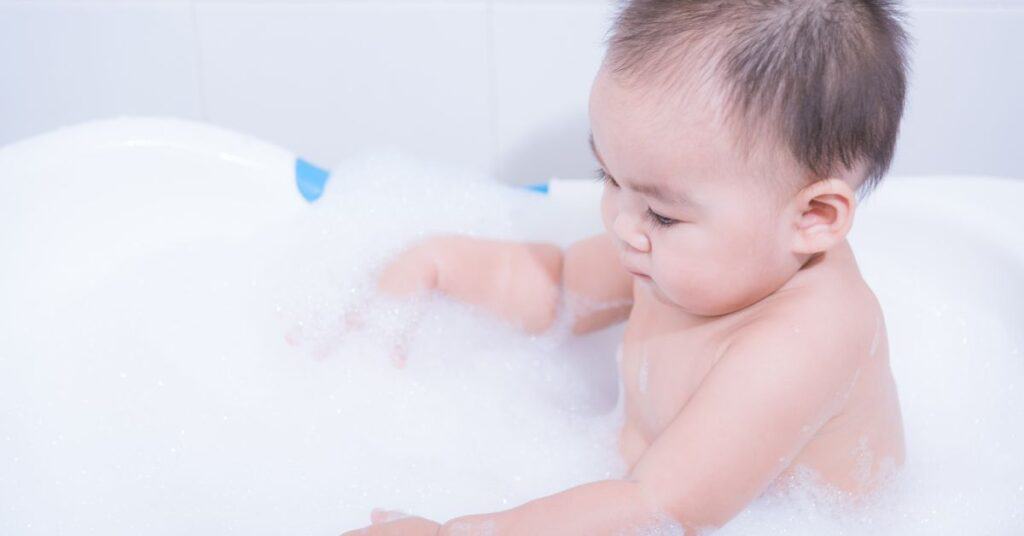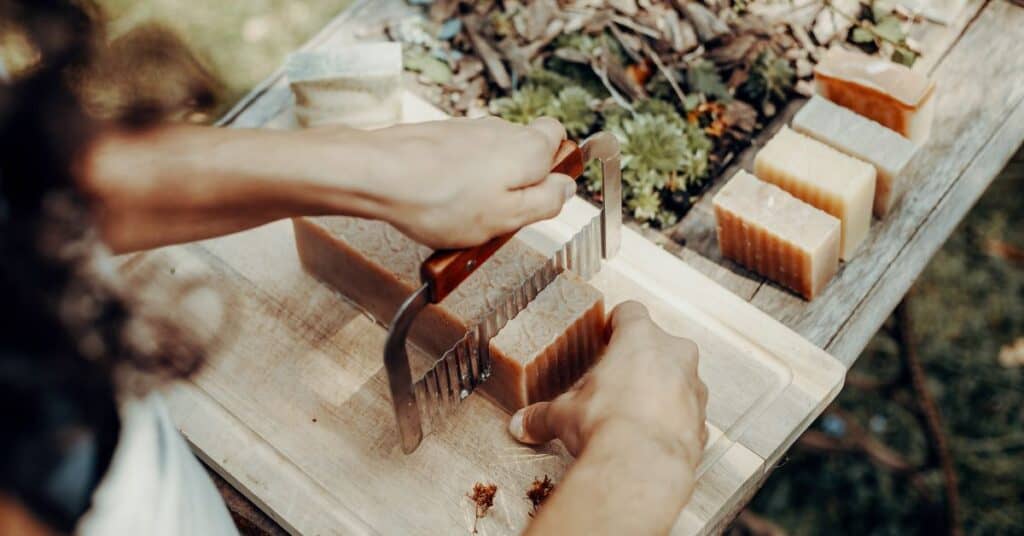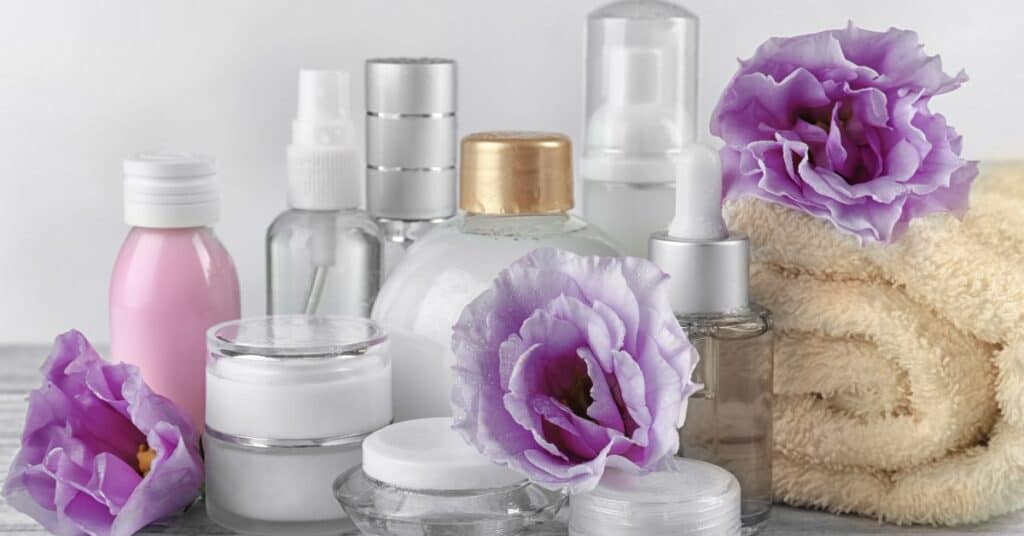Table of Contents
- Can You Use Soap On A 2-Week-Old Baby?
- When Can I Start Using Soap For My Newborn?
- At What Age Can Kids Use Ordinary Soap?
- Why Not Use Soap On Newborns?
- How To Select The Best Baby Soap For Bathing
- How Do You Choose The Best Baby Soap For Dry Skin
- Final Thought
Would you want to know how old for baby to use soap? From my experience as a mother and a soap maker, you can start giving your baby unscented bath water when they are 4 to 6 weeks old.
Be careful to use very little so you don’t hurt their skin. A drop of light shampoo may be all they need for longer-haired babies with wet hair.
Lather it up and then rinse it off. But giving babies baths too often, especially in the winter, can dry out their skin.
Soaking in a tub of soapy water can also hurt the urethra, which can make you more likely to get a UTI (especially if you are a girl). Scented soap vs vagina imbalance
If your child has eczema, which is red, dry, itchy skin spots, especially on the face and where the elbows and knees bend, ask his pediatrician for advice on how to bathe and take care of his skin as part of his treatment.
Children with acne may be more sensitive to the chemicals in soap and lotion.
Of course, kids who don’t have eczema can still be sensitive to bath products. If your baby gets a rash or feels itchy, call his doctor.
But that’s not all. As you read on, I’ll tell you more about how old a baby should be to use soap to keep them safe.
Now, let’s get started.
Can You Use Soap On A 2-Week-Old Baby?
No. Soap will dry your baby’s skin, so don’t use it. But to clean your baby’s body, use a towel wet with plain or soapy water.
Make sure the soap you use is gentle and soft. Pay close attention to the folds under the arms, behind the ears, around the neck, and where the nappy goes. Clean your baby’s toes and fingers as well.
As a first-time mom, I didn’t use anything at first. But after six months, I was told to use light baby soap. In the end, they turned to regular soap. It was the same with my second child at first.
But when my second child got terrible eczema at six months, we switched from soap to watery cream for her.
Reading a lot about it and looking up the ingredients in soaps and creams led us to decide that neither of our kids should use any products in the bath.
They are 7 and 4 years old, but they don’t use soap in the tub. After taking a bath, they look and smell so clean:) And they use soap to wash their hands after going into the bathroom and other times.
They’ll wash their feet with soap if their feet get so dirty that a bath doesn’t clean them (which doesn’t happen very often).
If you change your mind later, you can use soap, but you don’t need it when the baby is only one month old.
Also, read the labels and avoid sodium laurel sulfate, which is used in many products to foam up but is not clean. It is also bad for your eyes and face.
When Can I Start Using Soap For My Newborn?
Clean your child with a baby wash or light soap that only slightly foams up in the first year. Skincare products for babies are kinder and less likely to hurt the skin. Also, kids don’t need soap to lather up well.
“Regular soap is made to get rid of smelly, oily skin, and babies don’t mind that,”
In general, it is fine to use baby soap on newborn kids. However, you should only use plain water for the first few weeks to clean your sensitive skin.
As their skin gets older and they come into contact with more dirt or smells, you can switch to a light soap made just for babies.
It’s essential to pick a mild soap that doesn’t contain any allergens or strong chemicals, and if your baby has sensitive skin or certain skin conditions, talk to your doctor.
At What Age Can Kids Use Ordinary Soap?
Use baby products or very light soap on your baby’s body areas that truly require it till he is roughly a year old. (You might need to clean some additional locations if he starts eating solid meals.)
A wide selection of children’s cleansers is available, including body washes, shampoos, and soaps for babies. So how can you choose which is the best?
1. Select the appropriate kind:
When you visit a baby body wash store, many options might be overwhelming. First, you must decide what product you want: shower gels, body washes, or bar soaps.
You can use shampoo on your baby’s body without any justification. In actuality, shampoos contain more components than a regular bar of soap.
Baby body wash is a safer and better option. In any case, always test new soaps before purchasing them. If you have skin irritation or rash, swap out the soap immediately.
2. Select mild baby cleansing products:
You should select a body wash or soap with only natural elements for your baby’s skin. Any harsh component of the soap has the potential to irritate skin and result in a rash.
Make use of soaps devoid of substances that might be dangerous. Any harsh element in the soap can irritate the skin and result in a rash.
Examine the ingredients: Avoid soaps that include alcohol, glycol, propylene, and other chemicals to preserve your skin.
They are all recognized as dangerous substances contained in infant goods.
Additionally, look for dye-free soap since red dye, frequently found in soaps, can trigger allergies in children.
Why Not Use Soap On Newborns?
Since soaps can cause your baby’s skin to dry, if significantly contaminated areas require cleaning, use only mild, additive-free soaps with a neutral pH.
Right quickly, rinse the soap from your skin. Use a gentle shampoo or body wash twice or thrice weekly to clean your baby’s hair.
But these are the ways to bathe your infant comfortably and safely:
1. Wipe your baby’s eyes (from inner to outer) with cotton wool or a gentle washcloth bathed in warm water before undressing them.
Empty any excess water. Use a fresh cotton wool pad or a clean portion of the cloth for every wipe. Next, cleanse your entire face. Take care to avoid putting anything in your baby’s nose or ears.
2. Take off your baby’s clothes, removing the nappies.
3. Support your baby’s torso with one arm while cradling their head and shoulders with the other. Put your infant’s feet in the bath gently first. Hold your infant tightly at all times.
4. Use a gentle washcloth and warm water to give your infant a gentle wash. If necessary, use a gentle baby cleaner.
Prioritize cleaning your baby’s torso and neck, then their genitalia and lower body. Additionally, wipe your baby’s body creases to remove any traces of poop, vomit, or milk.
How To Select The Best Baby Soap For Bathing
The following advice will help you select the finest soap for infant skin:
1. Formulation with low allergens
Choose baby soaps with the hypoallergenic label. These formulations are perfect for newborns with sensitive skin since they are mainly made to reduce the possibility of allergic reactions.
Verify if the product satisfies the requirements by looking for the hypoallergenic claim on the label.
2. Choices Free of Fragrances
smells can irritate delicate skin, so look for baby soaps with subtle, natural smells or without any fragrance at all.
Products without fragrances are less likely to irritate your baby’s sensitive skin and are, therefore, gentler.
3. Advice from Dermatologists
For advice on soap recommendations, speak with your dermatologist or pediatrician.
These medical experts can offer tailored guidance depending on the particular skin requirements of your child and any current sensitivity.
Their knowledge guarantees that you make a choice that is in line with the welfare of your infant.
4. Equilibrium pH Soaps
The pH of the soap greatly influences the natural equilibrium of your baby’s skin. Choose soaps with a pH balance, meaning they are neither excessively alkaline nor too acidic.
Maintaining the skin’s barrier of defense helps avoid dryness and irritation. Select goods devoid of colors, artificial scents, and harsh chemicals.
5. If your child has known allergies, look for baby soap that doesn’t contain any allergens.
6. For tailored advice based on your infant’s unique requirements and skin sensitivity, speak with your dermatologist or pediatrician.
How Do You Choose The Best Baby Soap For Dry Skin
Consider the following factors while selecting a baby wash:
1. Make sure the formula is tear-free to prevent upsetting your baby’s eyes.
2. Babies with eczema, allergies, or dry skin benefit most from hypoallergenic shampoos.
3. you should only use unscented baby washes because scented products might trigger allergic responses. Choose a moderate, naturally scented wash if you really must have a smell.
Steer clear of harsh surfactants.
Dryness can be made worse by harsh surfactants like sodium lauryl sulfate, which can deplete the skin of its natural oils.
Pick infant soaps that clean without upsetting the skin’s natural moisture balance, thanks to their light and delicate surfactants.
4. Ingredients for Humectants
Glycerin is an example of an element in infant soap that attracts and holds moisture; look for it. Humectants fight dryness and encourage a smooth, soft complexion by moisturizing skin.
5. Infusions of Muesli
Oatmeal is one calming component that is well-known for its capacity to soothe dry, irritated skin.
Baby soaps infused with oats can benefit newborns with dry skin since they offer moisture and comfort.
Final Thought
Now that we have established How old is it for the baby to use soap, it’s crucial to take your kid’s skin sensitivity, degree of spoiling, and the existence of sweat or scent into account while using baby soap.
For newborns, it’s usually best to start with water alone. As your baby’s skin ages, you may add a moderate, delicate baby soap to their washing regimen.
Always pick baby-specific soaps, paying attention to components devoid of allergens, pH balance, and mildness.
If you have any worries about your baby’s skin or any particular skin issues, you should always seek advice from your pediatrician.



